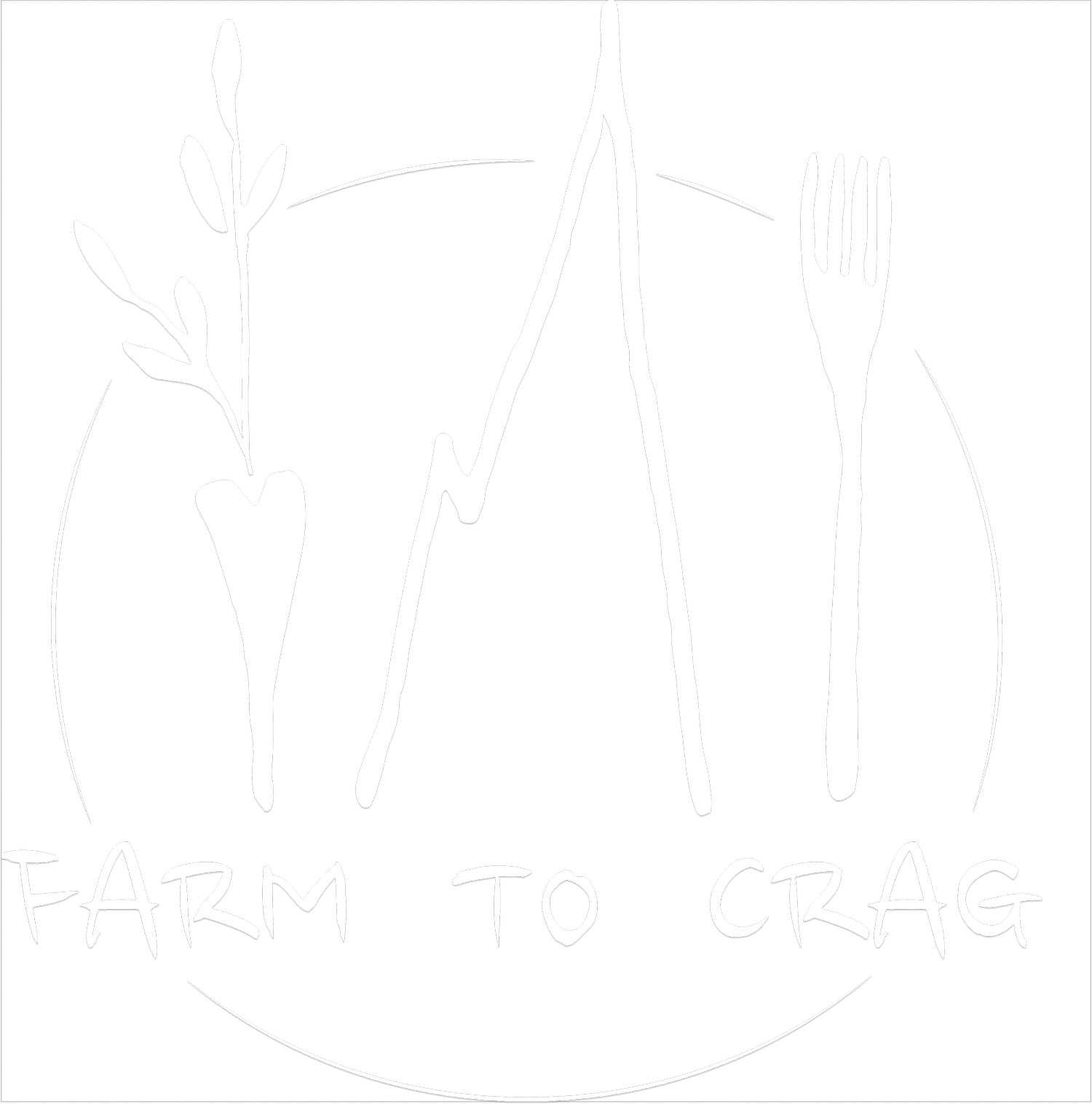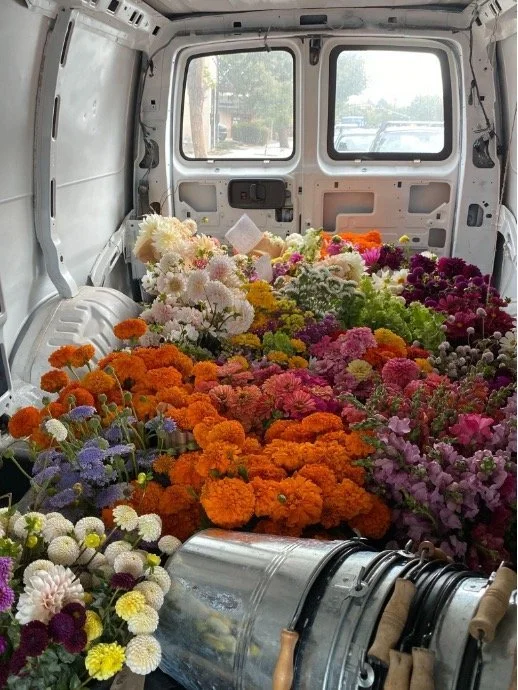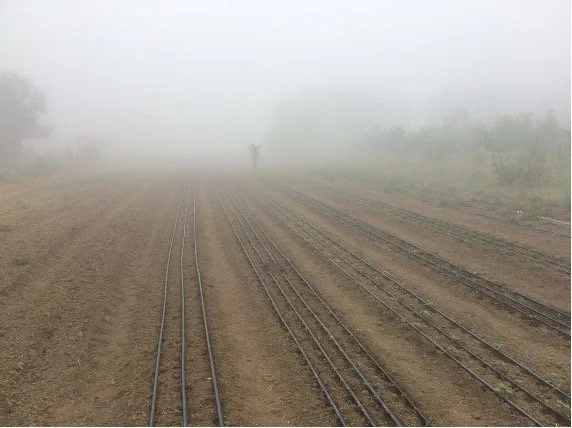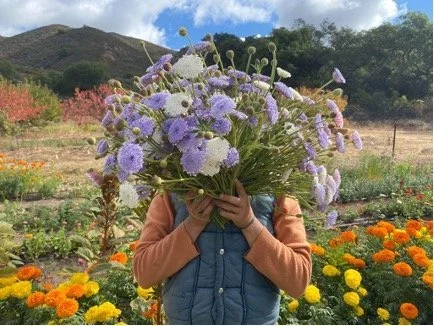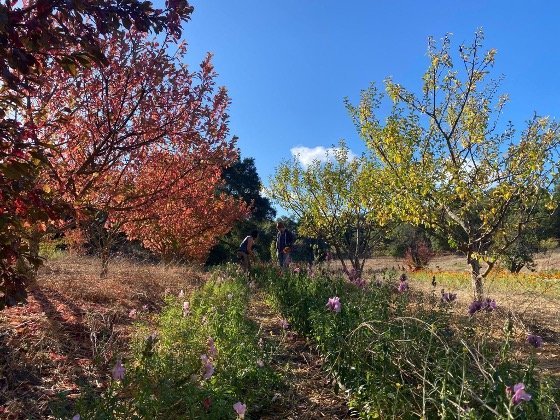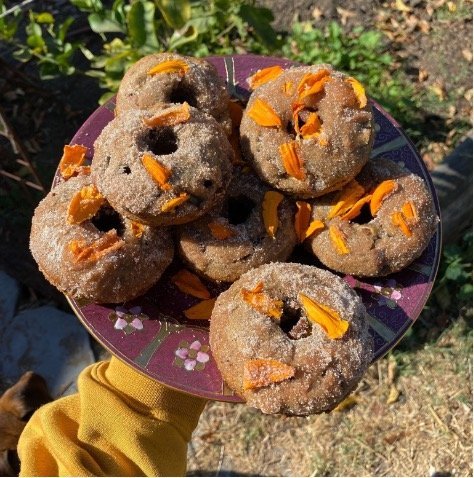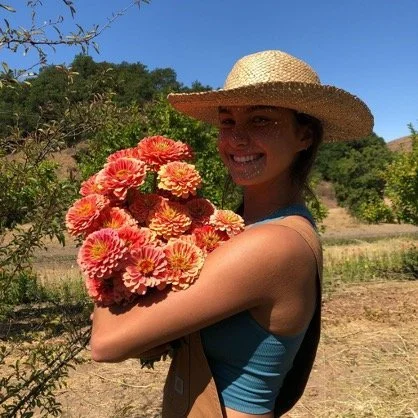Farmermaid Flowers
A climber’s journey in organic flower farming on California’s Central Coast.
Farmers markets are a unique place where the climbing and farming communities overlap. There are always familiar faces from the local gym (The Pad) that stroll through the farmers market and it is a joy to use conversation to blend the activities, farming, and climbing. To be at the center of this intersection is a special place to be and cultivates a strong community that bridges the local climbing and farming communities.
Van full of fresh cut flowers for the downtown San Luis Obispo farmers market. Photo - Lilja Jelks
Founded by Courtney Mellblom in 2016, Farmermaid Flowers has established itself as one of the few local, organic, flower farmer-florists of California’s Central Coast. Courtney uses regenerative agriculture practices to sequester carbon, reduce greenhouse gas emissions and increase biodiversity. Currently, we disk and till the fields while trying to minimally disturb the soil. We have had success with no-till experiments using silage tarps to kill weeds, although farming in heavy-clay soil without a budget for compost proves very hard to plant into. Another valued part of the business is to cultivate community connections, like sharing extra flowers with community organizations such as Lumina Alliance, our local women’s shelter.
Lilja climbing South Face on Moro Rock in Sequoia & Kings Canyon - homelands of the Mono (Monache), Yokuts, Tübatulabal, Paiute, and Western Shoshone. Photo - Dan Keeley
I was introduced to Courtney in 2018 and, as a side job, began helping with tasks here and there as I was completing my undergraduate degree. As Courtney worked to establish her business, I took my college courses and became introduced to the climbing world. Courtney does not climb but considers herself climbing curious - always in support of her friends' passions, both in the field and at the crag.
Farm in the Tule fog. Photo - Courtney Mellblom.
As summers rolled around, I would hear about the crop popping up at the farm, signaling the season starting. One thing is universal for flower farmers: summer is the busiest season. Walking into the flower fields during the summer is joyful. We slowly make our way up and down the furrows while harvesting truck-beds worth of flowers, stopping for an apricot as a snack off the nearby trees. Long days in the field draw similar parallels to a day at the crag; moving your muscles in rhythmic manors, staying hydrated, loading on sun protection, and refining the particular precision of grabbing one stem at a time to snip it. As long as we keep cutting, the flowers keep giving… until October. Then things start to slow down again, temperatures drop, the autumnal sunshine lights up the grasses and leaves in a whimsical way that I always seem to forget, but then remember with ease and cannot stop noticing.
Simultaneously, the climbing scene in California reawakens as the temperatures drop. Weekend trips to Yosemite are etched into the schedule and savored. In these fall months, we harvest what is in the field before wandering over to the single walnut tree for a harvest snack.
Courtney showing off the majestic didiscus harvest. Photo - Lilja Jelks.
Summer on the Central Coast was dry. Now, at the beginning of November, we keep our eyes on the weather forecast for any sort of precipitation. So far we have had one rainfall that brought 3 inches in October.
At Farmermaid Flowers, there is a particularly unique window of time (between the first rains) because this is the most fertile time to seed cover crops in the empty fields. Cover crop is a beneficial regenerative agricultural practice that enriches the soil, prevents erosion, improves water retention, increases biodiversity, increases organic matter in the soil and once mowed, can be used as mulch.
Preparing for a cover cropping season is like a recipe; once the soil is workable after the first rain, disc the fields, keep your eyes on the weather forecast, and a day before the next rain, go to the fields and seed the cover crop. This way, the seeds will germinate best after getting soaked in the rain and grow deep roots into the rich and moistened soil. Courtney’s favorite cover crops to seed for the winter are legumes and grasses: vetch, field peas, bell beans, oats, barley, triticale. She has also used biofumigant cover crops with spicy mustard varieties to help address pest and disease issues in an organic and regenerative manner.
Autumn on the farm. Photo - Lilja Jelks.
In the summers, we use buckwheat and sunn hemp as cover crops. However, we did not sow any cover crop this summer because we could not spare the water.
At the local farmer’s markets, Farmermaid is involved in much more than selling flowers. The markets are intersections for connecting with others. The hour before the market opens to the public, and all the vendors have set up their booths, is a social hour for the farmers… How's the farm doing? Any news on your seed order? What are the new varieties in season?
Once the bell rings to commence selling is when the diverse connections and conversations begin. We see old and new faces, brighten people’s day, answer curious questions, and share the love of organic farming.
Farmers markets are a unique place where the climbing and farming communities overlap. There are always familiar faces from the local gym (The Pad) that stroll through the farmers market and it is a joy to use conversation to blend the activities, farming, and climbing. To be at the center of this intersection is a special place to be and cultivates a strong community that bridges the local climbing and farming communities. Climbers can get connected to Farmermaid Flowers through Instagram @farmermaidflowers and the website farmermaidflowers.com.
Keep your eyes out for the local, organic, flower farm in your area. As a climber, farmer, and food lover I have realized that a bouquet set on the table is an important element of my nourishing meal experience. With proper knowledge, edible flower petals sprinkled on top of salads and sweet treats is an extra bonus.
Edible flowers and organic farming is an exclusive relationship. Since the large-scale flower industry is polluted with pesticides - edible flowers should only be chosen from organic sources. I encourage you to ask your local organic flower farmer how you can incorporate the seasonal flowers into your meals, whether it be for dinner table decor or in your recipes.
